CREATION OF MAN
Rabbi Simeon then rose and spoke: In meditating, I have perceived that when God was about to create man, then above and below all creatures commenced to tremble. The course of the sixth day was unfolding when at last the divine decision was made. Then there blazed forth the source of all lights and opened up the gate of the East, from where light flows. The light which had been bestowed on it at the beginning, the South gave forth in full glory, and the South took hold upon the East. The East took hold on the North, and the North awakened and, opening forth, called loud to the West that he should come to him. Then the West travelled up into the North and came together with it, and after that the South took hold on the West, and the North and the South surrounded the Garden, being its fences. Then the East drew near to the West, and the West was gladdened and it said, "Let us make man in our image, after our likeness" {Gen. 1:26}, to embrace like us the four quarters and the higher and the lower. Thereupon were East and West united, and produced man. Therefore have our sages said that man arose out from the site of the Temple.
Moreover, we may regard the words "Let us make man" as conveying this: to the lower beings who derived from the side of the upper world God disclosed the secret of how to form the divine name Adam, in which is encompassed the upper and the lower, in the force of its three letters alef, dalet, and mem final. When the three letters had come down below, there was perceived in their form, complete, the name Adam, to comprehend male and female. The female was fastened to the side of the male, and God cast the male into a deep slumber, and he lay on the site of the Temple. God then cut the female from him and decked her as a bride and led her to him,, as it is written, "And he took one of his sides, and closed up the place with flesh" {Gen. 2:21}. In the ancient books, I have seen it said that here the word "one" means "one woman," that is, the original Lilith, who lay with him and from him conceived. But up to that time, she was no help to him, as it is said, "but for Adam there was not found an help meet for him" {Gen. 2:20}*. Adam, then, was the very last, for it was right he should find the world complete when he made his appearance.
"No shrub of the field was yet in the earth" {Gen. 2:5}
Rabbi Simeon went on to say: The allusion is to the magnificent trees which grew later, but as yet were minute. Adam and Eve, as we have said, were created side by side. Why not face to face? For the reason that heaven and earth were not yet in complete harmony, "the Lord God had not caused it to rain upon the earth" {Gen. 2:5}. When the lower union was rendered perfect, and Adam and Eve turned face to face, then was the upper union perfected.
This we may know from the matter of the Tabernacle: for we have learned that together with it there was put up another tabernacle, nor was the upper one raised until the lower one was erected; and so it was in this case. Moreover, inasmuch as all above was not yet perfectly ordered, Adam and Eve were not created face to face. This is borne out by the order of the verses in the Scripture; first it is written, "For the Lord God had not caused it to rain upon the earth," and following, "there was not a man to till the ground" {ibid.}, and it signifies that man was yet imperfect, for only when Eve was made perfect, was he then made perfect too. Further proof is that in the word vayisgor {and he closed}, there occurs for the first time in this passage the letter samekh, which signifies "support", as much as to say that male and female they now supported the one the other. In like wise, do the lower world and the upper sustain each other. Not until the lower world was made perfect, was the other world also made perfect. When the lower world was made to support the upper, by being turned face to face with it, the world was then finished, for previously "the Lord God had not caused it to rain upon the earth."
Then, "There went up a mist from the earth" {Gen. 2:6}, to make up for the lack, by "watering the whole face of the ground" {ibid.}; and the mist rising is the yearning of the female for the male. Yet another interpretation says that we take the word "not" from the first verse to use in the second with "mist", and this means that God failed to send rain because a mist had not gone up, for from below must come the impulse to move the power above. Thus, to form the cloud, vapour ascends first from the earth. And likewise, the smoke of the sacrifice ascends, creating harmony above, and the uniting of all, and so the celestial sphere has completion in it. It is from below that the movement starts, and thereafter is all perfected. If the Community of Israel failed to initiate the impulse, the One above would also not move to go to her, and it is thus the yearning from below which brings about the completion above.
___________
* CJB: "But for Adam there was not found a companion suitable for helping him."
Moreover, we may regard the words "Let us make man" as conveying this: to the lower beings who derived from the side of the upper world God disclosed the secret of how to form the divine name Adam, in which is encompassed the upper and the lower, in the force of its three letters alef, dalet, and mem final. When the three letters had come down below, there was perceived in their form, complete, the name Adam, to comprehend male and female. The female was fastened to the side of the male, and God cast the male into a deep slumber, and he lay on the site of the Temple. God then cut the female from him and decked her as a bride and led her to him,, as it is written, "And he took one of his sides, and closed up the place with flesh" {Gen. 2:21}. In the ancient books, I have seen it said that here the word "one" means "one woman," that is, the original Lilith, who lay with him and from him conceived. But up to that time, she was no help to him, as it is said, "but for Adam there was not found an help meet for him" {Gen. 2:20}*. Adam, then, was the very last, for it was right he should find the world complete when he made his appearance.
"No shrub of the field was yet in the earth" {Gen. 2:5}
Rabbi Simeon went on to say: The allusion is to the magnificent trees which grew later, but as yet were minute. Adam and Eve, as we have said, were created side by side. Why not face to face? For the reason that heaven and earth were not yet in complete harmony, "the Lord God had not caused it to rain upon the earth" {Gen. 2:5}. When the lower union was rendered perfect, and Adam and Eve turned face to face, then was the upper union perfected.
This we may know from the matter of the Tabernacle: for we have learned that together with it there was put up another tabernacle, nor was the upper one raised until the lower one was erected; and so it was in this case. Moreover, inasmuch as all above was not yet perfectly ordered, Adam and Eve were not created face to face. This is borne out by the order of the verses in the Scripture; first it is written, "For the Lord God had not caused it to rain upon the earth," and following, "there was not a man to till the ground" {ibid.}, and it signifies that man was yet imperfect, for only when Eve was made perfect, was he then made perfect too. Further proof is that in the word vayisgor {and he closed}, there occurs for the first time in this passage the letter samekh, which signifies "support", as much as to say that male and female they now supported the one the other. In like wise, do the lower world and the upper sustain each other. Not until the lower world was made perfect, was the other world also made perfect. When the lower world was made to support the upper, by being turned face to face with it, the world was then finished, for previously "the Lord God had not caused it to rain upon the earth."
Then, "There went up a mist from the earth" {Gen. 2:6}, to make up for the lack, by "watering the whole face of the ground" {ibid.}; and the mist rising is the yearning of the female for the male. Yet another interpretation says that we take the word "not" from the first verse to use in the second with "mist", and this means that God failed to send rain because a mist had not gone up, for from below must come the impulse to move the power above. Thus, to form the cloud, vapour ascends first from the earth. And likewise, the smoke of the sacrifice ascends, creating harmony above, and the uniting of all, and so the celestial sphere has completion in it. It is from below that the movement starts, and thereafter is all perfected. If the Community of Israel failed to initiate the impulse, the One above would also not move to go to her, and it is thus the yearning from below which brings about the completion above.
___________
* CJB: "But for Adam there was not found a companion suitable for helping him."
[full original text follows... ☟ ]
Volume 1:34a
א
וּמִנֵּיהּ נָקְטָא שְׁמָא. וְאִתְקְרֵי הַאי אֲרוֹן אֲדוֹן בְּרָזָא דְּאָלֶ''ף דָלֶ''ת נוּ''ן יוּ''ד. כְּמָה דְּאַמְרִינָן צַדִּיק וְצֶדֶק כָּךְ אֲדוֹ''ן אדנ''י דָּא בְדָא תַּלְיָין.
ב
תָּא חֲזֵי, כֹּכָבִים וּמַזָּלוֹת בִּבְרִית קַיָּימִין דְּאִיהוּ (שמשא דקאמרן ודא) רְקִיעַ הַשָּׁמָיִם דִּרְשִׁימִין בֵּיהּ וּגְלִיפִין בֵּיהּ כֹּכָבִים וּמַזָּלוֹת וּבֵיהּ תַּלְיָין לְאַנְהָרָא. רִבִּי יֵיסָא סָבָא הֲוָה אָמַר הָכִי יְהִי מְאֹרֹת דְּתַלְיָיא בִּרְקִיעַ הַשָּׁמָיִם וְדָא סִיהֲרָא דְתַלְיָיא בֵּיהּ. כֵּיוָן דִּכְתִיב וְהָיוּ לִמְאוֹרוֹת הָא שִׁמְשָׁא (כאן חסר) וּלְמוֹעֲדִים דְּהָא זִמְנַיָיא וְחַגִּין יְרָחִין וְשַׁבַּתֵּי בְּהוּ תַּלְיָאן וְהֲווּ.
ג
וְכֹלָּא בַּעֲבִידְתָּא קַדְמָאָה עִלָּאָה. דִּשְׁמֵיהּ קַדִּישָׁא אִתְאַחִיד בֵּיהּ. וְאִיהוּ הוּא כֹּלָּא. שִׁבְעָה כֹּכְבֵי אִנּוּן לָקֳבֵל שִׁבְעָה רְקִיעִין וְכֻלְהוּ מַדְּבְרֵי עָלְמָא. וְעָלְמָא עִלָּאָה עֲלַיְיהוּ. וּתְרֵין עָלְמִין נִינְהוּ עָלְמָא עִלָּאָה וְעָלְמָא תַּתָּאָה. תַּתָּאָה כְּגַוְונָא דִּלְעֵילָא דִּכְתִיב, (דבה הימים א טז) מִן הָעוֹלָם וְעַד הָעוֹלָם. מֶלֶךְ עִלָּאָה. וּמֶלֶךְ תַּתָּאָה. (תנינן) כְּתִיב יְיָ מֶלֶךְ יְיָ מָלָךְ יְיָ יִמְלוֹךְ לְעוֹלָם וָעֶד. יְיָ מֶלֶךְ לְעֵילָא. יְיָ מָלָךְ בְּאֶמְצָעִיתָא. ה' יִמְלוֹךְ לְתַתָּא. רִבִּי אַחָא אָמַר יְיָ (נ''א דא חכמה עילאה) מֶלֶךְ דָּא עָלְמָא עִלָּאָה דְּאִיהוּ עָלְמָא דְּאֲתֵי. יְיָ מָלָךְ דָּא תִּפְאֶרֶת יִשְׂרָאֵל. יְיָ יִמְלוֹךְ דָּא אֲרוֹן הַבְּרִית (נ''א רבי אחא אמרז יי מלך דא חכמה עלאה. יי מלך דא עלמא עלאה דאתי. יי ימלוך דא תפארת ישראל).
ד
אֲתָא זִמְנָא אָחֳרָא דָּוִד וְאַהֲדַר לוֹן מִתַּתָּא לְעֵילָא. וְאָמַר (תהילים י׳:ט״ז) יְיָ מֶלֶךְ עוֹלָם וָעֶד. יְיָ מֶלֶךְ לְתַתָּא. עוֹלָם בְּאֶמְצָעִיתָא. וָעֶד לְעֵילָא. דְּתַמָּן וִיעוּדָא וְקִיּוּמָא וְאַשְׁלֵימוּתָא דְּכֹלָּא. מֶלֶךְ לְעֵילָא יִמְלוֹךְ לְתַתָּא.
ה
רִבִּי אַבָּא אָמַר כָּל הָנֵי מְאוֹרוֹת כֻּלְהוּ מִתְחַבְּרָן בִּרְקִיעַ הַשָּׁמָיִם. לְהָאִיר עַל הָאָרֶץ לְאַנְהָרָא עַל אַרְעָא. מָאן הוּא רְקִיעָא דְּנָהִיר עַל אַרְעָא. הוֵי אֵימָא דָּא נָהָר דְּנָגִיד וְנָפִיק מֵעֵדֶן דִּכְתִיב וְנָהָר יוֹצֵא מֵעֵדֶן לְהַשְׁקוֹת אֶת הַגָּן.
ו
תָּא חֲזֵי, כֵּיוָן דְּסִיהֲרָא שָׁלְטָא וְאִתְנְהִיר מֵהַהוּא נַהֲרָא דְּנָגִיד וְנָפִיק. כָּל אִנּוּן שְׁמַיָא דִּלְתַתָּא וְחֵילֵיהוֹן כֻּלְהוֹן אִתּוֹסְפָן נְהוֹרָא. וְכֹכְבַיָא דִּמְמַנָּן עַל אַרְעָא כֻּלְהוּ שָׁלְטִין וּמְגַדְּלִין צְמָחִים וְאִילָנִין. וְעָלְמָא אִתְרַבֵּי בְּכֻלְהוּ. וְאֲפִילּוּ מַיָא וְנוּנֵי יַמָּא כֻּלְהוּ בִּרְבוּ יַתִּיר. וְכַמָּה גַּרְדִּינִי נִימוּסִין שָׁאטָן בְּעָלְמָא. בְּגִין דְּכֻלְהוּ בְּחֶדְוָה בִּרְבוּ חֵילָא. כַּד חֶדְוָה הוּא בְּבֵי מַלְכָּא אֲפִילוּ אִנּוּן מִבֵּי תַּרְעֵי. וְאֲפִילוּ אִנּוּן מִדְּבֵי טַרְנָשֵׁי (נ''א טרטשי). כֻּלְהוּ חָדָן וְשָׁטָאן בְּעָלְמָא. וְרַבְיֵי דְּעָלְמָא בַּעֲיָין לְאִסְתַּמְּרָא.
ז
רִבִּי אַחָא אָמַר. וַיִּתֵן אוֹתָם אֱלהִים בִּרְקִיעַ הַשָּׁמָיִם. וְכַד כֻּלְהוֹן קַיָּימִין בֵּיהּ כְּדֵין חֶדְוָותָא דָּא עִם דָּא, כְּדֵין סִיהֲרָא אַזְעִירַת נְהוֹרָא מִקַּמֵּי שִׁמְשָׁא. כָּל מַה דְּנָטִיל בְּגִין לְאַנְהָרָא לָהּ הֲדָא הוּא דִכְתִיב לְהָאִיר עַל הָאָרֶץ.
ח
רַב יִצְחָק אָמַר כְּתִיב, (ישעיהו ל׳:כ״ו) וְהָיָה אוֹר הַלְּבָנָה כְּאוֹר הַחַמָּה וְאוֹר הַחַמָּה יִהְיֶה שִׁבְעָתַיִם כְּאוֹר שִׁבְעַת הַיָּמִים. מָאן שִׁבְעַת הַיָּמִים. אִלֵּין אִנּוּן שִׁבְעַת יוֹמִין דִּבְרֵאשִׁית. רִבִּי יְהוּדָה אָמַר אִלֵּין אִנּוּן שִׁבְעַת יְמֵי הַמִּלּוּאִים. מִלּוּאִים וַדַּאי. בְּגִין דְּהַהוּא זִמְנָא אִתְבַּסַּם עָלְמָא וְאִתְהַדַּר בְּאַשְׁלָמוּתֵיהּ וְלָא אִתְפְּגִים סִיהֲרָא בְּגִין חִוְיָא בִּישָׁא דִּכְתִיב בֵּיהּ (משלי ט״ז:כ״ח) וְנַרְגָּן מַפְרִיד אַלּוּף. וְאֵימָתַי יְהֵא דָּא בְּזִמְנָא דִּכְתִיב, (ישעיהו כ״ה:ח׳) בִּלַּע הַמָּוֶת לָנֶצַח. וּכְדֵין כְּתִיב, (זכריה י״ד:ט׳) בַּיּוֹם הַהוּא יִהְיֶה יְיָ אֶחָד וּשְׁמוֹ אֶחָד:
ט
יִשְׁרְצוּ הַמַּיִם שֶׁרֶץ נְפֶשׁ חַיָּה לְמִינָהּ. אָמַר רִבִּי אֶלְעָזָר אִלֵּין מַיִין תַּתָּאִין דְּרַחֲשִׁין זַיְינִין כְּגַוְונָא דִלְעֵילָא. אִנּוּן עִלָּאֵי וְאִנּוּן תַּתָּאֵי. רִבִּי חִיָּיא אָמַר עִלָּאֵי אַפִּיקוּ נֶפֶשׁ חַיָּה. וּמַאי נִיהוּ. דָּא נֶפֶשׁ דְּאָדָם קַדְמָאָה כְּמָה דְאַתְּ אָמֵר וַיְהִי הָאָדָם לְנֶפֶשׁ חַיָּה. וְעוֹף יְעוֹפֵף עַל הָאָרֶץ אִלֵּין שְׁלִיחֵי עִלָּאִין דְּאִתְחַזּוּן לִבְנֵי נָשָׁא בְּחֵיזוּ דְּבַר נָשׁ. מַשְׁמַע דִּכְתִיב יְעוֹפֵף עַל הָאָרֶץ. בְּגִין דְּאִית אָחֳרָנִין דְּלָא אִתְחַזּוּן אֶלָא בְּרוּחָא מַמָּשׁ לְפוּם סֻכְלְתָנוּ דִּבְנִי נְשָׁא.
Labels: Creation of Man, Ein Sof, English translations, Gershom Scholem, Jewish mysticism, Judaism, Kabbalah, man, Sefirot, Tree of Life, woman, Zohar
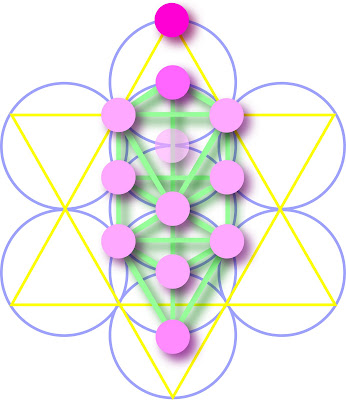

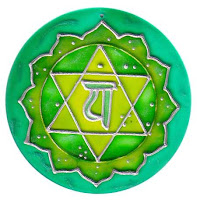

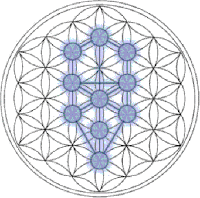

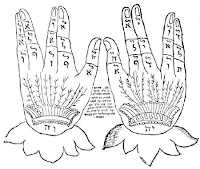

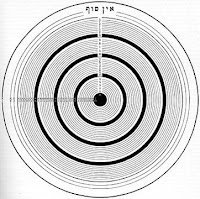
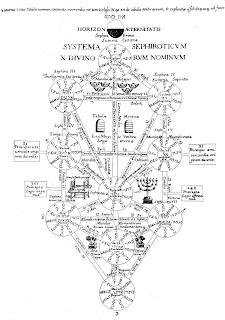
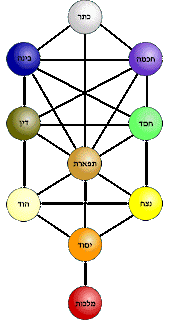
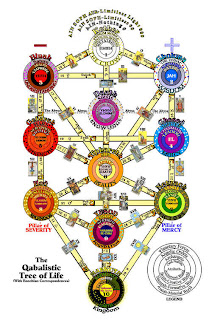

0 Comments:
Post a Comment
Subscribe to Post Comments [Atom]
<< Home